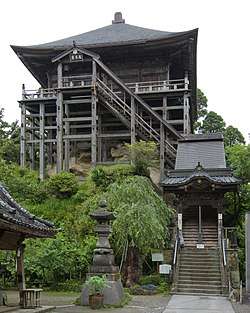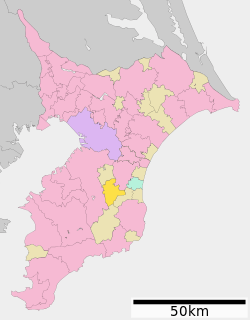Chōnan
Chōnan (長南町, Chōnan-machi) is a town located in Chiba Prefecture, Japan.
Chōnan 長南町 | |
|---|---|
Town | |
 Kasamori-ji in Chonan | |
Flag Seal | |
 Location of Chōnan in Chiba Prefecture | |
 Chōnan | |
| Coordinates: 35°23′N 140°14′E | |
| Country | Japan |
| Region | Kantō |
| Prefecture | Chiba Prefecture |
| District | Chōsei |
| Area | |
| • Total | 65.38 km2 (25.24 sq mi) |
| Population (April 2012) | |
| • Total | 8,774 |
| • Density | 134/km2 (350/sq mi) |
| Time zone | UTC+9 (Japan Standard Time) |
| Symbols | |
| • Tree | Japanese cypress |
| • Flower | Cherry blossom, safflower |
| • Bird | Japanese bush-warbler |
| Phone number | 0475-46-2111 |
| Address | 2110 Chōnan, Chōnan-machi, Chōsei-gun, Chiba-ken 297-0121 |
| Website | http://www.town.chonan.chiba.jp/ |
As of April 2012, the town had a population of 8,774, and a population density of 134 persons per km2. The total area is 65.38 square kilometres (25.24 sq mi).
Geography
Located in the mountainous terrains that divides the Bōsō Peninsula, Chōnan has relatively little flat land. Like other municipalities in the region, the town maintains agricultural reservoirs. Several golf courses dot the landscape.
History
Chōnan is rich in archeological sites from the Jōmon period, Yayoi period, and Kofun period periods. Under the ritsuryō reforms of the Nara period the area of present-day Chōnan became part of Kazusa Province. Two Tendai Buddhist temples were established in this period, Kasamori-ji and Chōfuku-ji. At the end of the Heian period the area came under the control of the military leader Taira no Tadatsune, and his descendants continued their control of the area in the Kamakura period. In the 1456 the Takeda clan built Chōnan Castle as an extension of the larger Mariyatsu Castle. After the establishment of the Tokugawa shogunate Chōnan became a major distribution center of goods, most notably salt, passing through the Bōsō Peninsula.[1] The modern town of Chōnan was created on February 11, 1955 from the merger of the former town of Chōnan with neighboring villages of Nishimura, Higashimura and Toyosaka.
Economy
The principal agricultural output of Chōnan is rice, and shiitake mushrooms and lotus root are cultivated in the town. There are also some small-scale dairy farms.[2]
Visitor attractions
- Kasamori-ji
- Kasamori Temple Forest Nature Area
- Hōon-ji
- Shōen-ji
- Shōtoku-ji
- Chōfukuju-ji
References
- "Chōnan-machi". Nihon Rekishi Chimei Taikei (日本歴史地名大系 “Compendium of Japanese Historical Place Names”) (in Japanese). Tokyo: Netto Adobansusha. 2012. Archived from the original on 2007-08-25. Retrieved 2012-02-01.
- "Chōnan-machi". Nihon Rekishi Chimei Taikei (日本歴史地名大系 “Compendium of Japanese Historical Place Names”) (in Japanese). Tokyo: Netto Adobansusha. 2012. Archived from the original on 2007-08-25. Retrieved 2012-02-01.